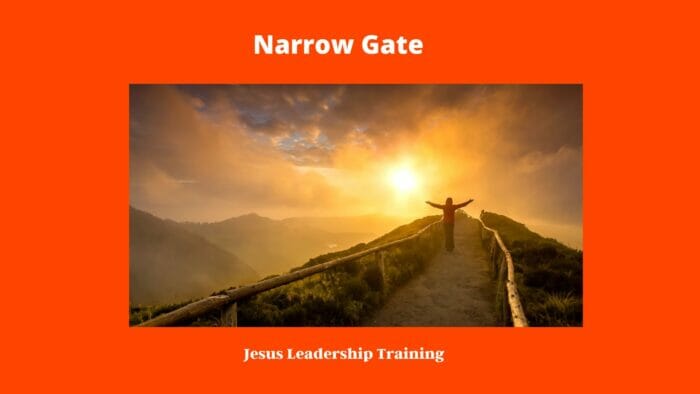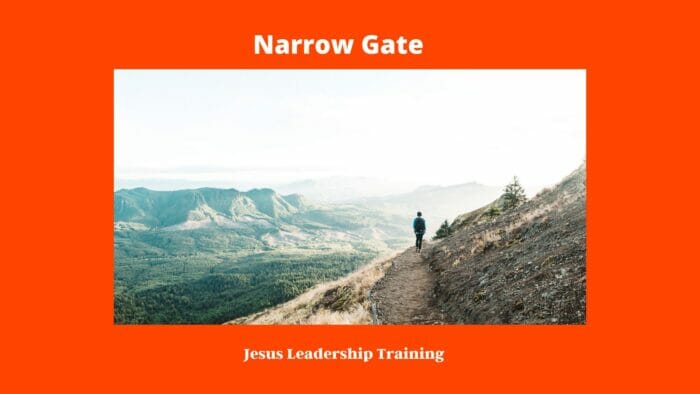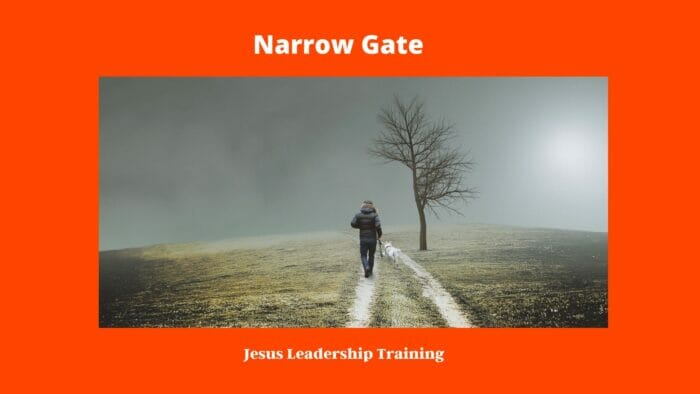The concept of the “Narrow Gate” is a compelling motif found in the Christian Bible. Not only does it serve as a metaphorical junction between the earthly and divine, but it also encapsulates an ethical and spiritual roadmap for believers. In this comprehensive guide, we’ll delve into the layers of meaning behind this term, looking closely at scriptural references and interpretations.
Table of Contents
The Concept of Narrow Gate 📖
The idea of a “narrow gate” in religious scripture isn’t merely about a physical gateway but more about a set of choices and the path one takes in life. In the broadest sense, it serves as a metaphor for making ethical decisions and leading a life that aligns with virtuous principles. This allegory is deeply embedded in Christian scripture and is used as a focal point for numerous sermons and theological discussions.
Narrow Gate Verse 📜
Narrow Gate and Wide Gate 👥
One of the most cited verses about the Narrow Gate comes from the book of Matthew, specifically Matthew 7:13-14. Here, Jesus says, “Enter through the narrow gate. For wide is the gate and broad is the road that leads to destruction, and many enter through it. But small is the gate and narrow the road that leads to life, and only a few find it.”
So what does this mean? At a glance, Jesus is contrasting two paths: one that is easy and leads to ruin, and another that is challenging but leads to eternal life. It’s a powerful reminder to choose our actions wisely, keeping the ultimate goal of spiritual fulfillment in sight.

Matthew 7 Narrow Gate 🌿
The chapter where this verse is found, Matthew 7, is part of the Sermon on the Mount, one of Jesus’ most famous teachings. The chapter touches on various aspects of Christian ethics, from judging others to the Golden Rule. The Narrow Gate serves as a capstone to these teachings, emphasizing that living a life in accordance with these principles won’t be the easiest path, but it’s the one that leads to spiritual richness.

What Did Jesus Mean by the Narrow Gate? ✨
Understanding the paths symbolized by the Narrow and Wide Gates can be pivotal to one’s journey, both spiritually and morally. To make this easier to grasp, here’s a table comparing the two:
Comparison Table: The Narrow Gate vs. The Wide Gate
| Features | The Narrow Gate | The Wide Gate |
|---|---|---|
| Difficulty | Challenging; requires discipline and moral courage. | Easy to enter; doesn’t require much effort. |
| Choices Required | Conscious and thoughtful choices favoring long-term goals. | Often impulsive choices aiming for immediate gratification. |
| Community Influence | Surrounded by like-minded, supportive individuals. | Influenced by a wide array of people, not all of whom may have your best interests at heart. |
| Materialistic Desires | Generally low; focus is on spiritual and ethical richness. | High; often fueled by the desire for wealth, fame, or physical pleasures. |
| Long-Term Fulfillment | High; leads to a life of purpose and meaning. | Low; can lead to a sense of emptiness over time. |
| Spiritual Growth | A key focus; often intertwined with daily activities. | Not a priority; may be neglected or overlooked. |
| Worldly Responsibilities | Balanced approach; worldly duties are not ignored but are aligned with spiritual goals. | Can be imbalanced; worldly gains might overshadow moral and spiritual responsibilities. |
| Impact on Mental Health | Generally positive; due to a sense of purpose and community support. | Can be negative; the lack of deeper fulfillment can lead to stress and dissatisfaction. |
| Eternal Implications | Leads to eternal happiness, according to the teaching. | Leads to eternal separation from the divine, as per the teaching. |
Remember, this table is an interpretation of the biblical teaching and can have different meanings to different people. However, it serves as a quick guide to understanding the fundamental differences between the two paths described by Jesus. So, whether you’re looking to make a small change or a complete lifestyle overhaul, this teaching offers valuable insights that can help guide your decisions.
Dangers of Making Choices by Following the Crowd According to Jesus’ Teaching on the Narrow Gate
| Dangers | Description | Long-Term Consequences |
|---|---|---|
| Loss of Individuality | Going with the flow can stifle your unique qualities and thoughts. | Limits personal growth and spiritual development. |
| Compromised Values | The crowd might not have the same ethical or moral standards as you do. | Erodes character and sense of integrity. |
| Short-Term Gratification | The crowd often seeks immediate pleasure, without considering long-term implications. | Missed opportunities for deeper, lasting happiness. |
| Lack of Accountability | In a crowd, it’s easy to shirk personal responsibility. | Erodes the development of a strong moral compass. |
| Pressure to Conform | The crowd often pressures individuals to conform to its norms, even if they’re detrimental. | Leads to a life lived by others’ standards, not your own. |
| Spiritual Stagnation | Following the crowd usually offers little in terms of spiritual growth. | Risks a life lacking in deeper meaning and purpose. |
| Potential for Harm | Crowds can engage in harmful behaviors, either intentionally or unintentionally. | Could lead to moral or even legal ramifications. |
It’s worth noting that this table simplifies complex concepts into digestible points. Always remember that spiritual journeys are deeply personal and can be more nuanced. However, understanding these dangers gives us a lens through which we can evaluate our choices, especially when we find ourselves tempted to simply go with the flow. So, take a moment to consider your path, it might make all the difference in reaching your spiritual destination!

Spiritual Benefits of Making Choices Following the Few According to Jesus’ Teaching on the Narrow Gate
| Benefits | Description | Long-Term Rewards |
|---|---|---|
| Deepened Spirituality | Following the few who walk the narrow path can help deepen your spiritual understanding and practice. | Eternal peace and deeper connection with the Divine. |
| Authentic Relationships | People on this path tend to have meaningful, purpose-driven lives, making for richer relationships. | A supportive network of genuine friends and loved ones. |
| Moral Integrity | The focus is on moral and ethical living, shaping you into a person of high integrity. | Gains respect and trust among your community and peers. |
| Enduring Happiness | Rather than quick fixes, the focus is on choices that bring lasting joy and fulfillment. | A life filled with true happiness and contentment. |
| Personal Growth | You’re encouraged to confront your weaknesses and improve, leading to personal growth. | Becomes a stronger, wiser, more resilient person. |
| Purpose and Direction | This path offers a clear sense of purpose, helping you navigate through life’s challenges. | Achieves a meaningful life that leaves a positive impact. |
| Eternal Reward | According to the teaching, walking this path leads to eternal life and closeness with the Divine. | Eternal peace, happiness, and a place in the Kingdom of Heaven. |
Remember, spiritual paths are unique for each individual, but these benefits offer a general idea of what one might experience when choosing to walk the narrow path. So whether you’re contemplating a major life decision or simply looking for ways to live more meaningfully, considering these benefits could provide just the perspective you need!

7 Key Lessons We Can Learn from Jesus’ Teaching on the Path to Heaven: The Mystery Behind the Narrow and Wide Gates
Jesus’ teaching about the “narrow way” to heaven is both insightful and transformative. Let’s break down this powerful concept into seven key spiritual lessons that can help guide us in our journey towards higher purpose and eternal happiness.
1. The Value of Conscious Choices
One of the primary lessons to draw from Jesus’ teaching is the importance of making conscious, deliberate choices in our lives. Unlike the wide path, where almost any choice will do, the narrow path requires us to think deeply about our actions, making sure they align with higher principles and values.
2. Discipline Matters
Walking the narrow path isn’t a stroll in the park; it demands discipline. Whether it’s about managing temptations, controlling impulses, or staying committed to your spiritual practices, discipline is a cornerstone. Essentially, being disciplined helps us to stay aligned with the divine will, even when life throws curveballs our way.
3. The Need for Spiritual Focus
Just as a laser beam focuses light to be more effective, the narrow way urges us to channel our energies on spiritual goals. It advises us to concentrate on what truly matters — love, kindness, justice, and spiritual growth — rather than dispersing our energy on less important matters.
4. Authenticity Over Popularity
It’s tempting to follow the crowd, especially when the crowd is heading down a path that looks fun and exciting. But the teaching of the narrow path encourages us to be true to ourselves and our spiritual journey, even if that means standing apart from the crowd. Authenticity, in this context, becomes a beacon that guides us toward the divine.
5. The Beauty in Simplicity
Another poignant lesson from this teaching is that a simple, straightforward life is often more rewarding than one filled with complexities that lead nowhere. Whether it’s the simplicity of honest work, the straightforwardness of clear communication, or the beauty of simple acts of kindness, the narrow path values simplicity over extravagance.
6. The Company You Keep
The journey along the narrow path is seldom a lonely one if you surround yourself with like-minded souls. The teaching subtly emphasizes the need for a supportive community that shares your spiritual objectives. Such a community can offer emotional support, spiritual guidance, and the kind of companionship that makes the narrow path not just bearable but enjoyable.
7. Eternal Rewards Await
The teaching assures us that walking the narrow path leads to eternal happiness and peace. It serves as a reminder that while the journey may be difficult, the rewards are infinitely better than any short-term gains from walking the wider, more accessible path.
These lessons can serve as a spiritual GPS, providing the directions and moral compass we often need to navigate the complexities of life. While the narrow path may seem daunting initially, these lessons show that its rewards — both in this world and the next — are well worth the effort.
What Does it Mean to Strive to Enter Through the Narrow Gate 🚪
The idea of “striving” is a vital part of understanding the Narrow Gate. This isn’t a gateway you stumble upon accidentally; it’s something you have to seek out and work to pass through. It involves self-examination, ongoing repentance, and a consistent effort to live according to ethical and spiritual principles. In short, it’s not a one-time decision but a lifelong journey.
What is the Narrow Gate Verse in Catholicism 🕊️
While the concept of the Narrow Gate is present across different Christian denominations, in Catholicism, the Catechism often references it when discussing the moral and ethical choices one should make in life. It serves as a reminder that the path to heaven is not one of ease and comfort but one that may require sacrifices and difficult decisions.
The Parallels in Other Faith Traditions 🌍
Buddhism 🕉️
Interestingly enough, the concept of a “narrow gate” isn’t unique to Christianity. In Buddhism, for example, the Eightfold Path to enlightenment could be seen as a similarly “narrow” path. Like the teachings of Jesus, Buddha’s guidance also encourages people to live mindfully, ethically, and compassionately, but the end goal is Nirvana rather than heaven. Both faiths emphasize that this journey isn’t a cakewalk; it requires a good deal of self-discipline, sacrifice, and moral integrity.
Islam 🌙
In Islam, the idea of a narrow path to righteousness and heaven also exists. Known as the Sirat al-Mustaqim (The Straight Path), Muslims pray for guidance along this path multiple times a day during their prayers. While the specifics differ, the concept of a narrow or challenging path towards eternal peace is strikingly similar to the Narrow Gate.
Practical Applications in Daily Life 👟
Making Choices 🤔
Every day, we’re presented with choices that either lead us closer to or further from our goals, both material and spiritual. Keeping the metaphor of the Narrow Gate in mind can serve as a helpful reminder to consider the long-term consequences of our actions, rather than opting for immediate gratification.
Building Community 👫
The journey through the Narrow Gate isn’t a solo expedition. Building a supportive community around you can provide you with companions for the journey. Whether this community comes in the form of a church, a social group aligned with your values, or a circle of friends and family who encourage you to be your best self, we’re often better equipped to face challenges when we’re not doing it alone.
Beyond the Texts 📚
The Narrow Gate is a rich metaphor that people have pondered for millennia, and it continues to inspire various forms of art, literature, and scholarly discussion. It’s a concept that transcends its biblical origins to offer valuable insights into human behavior and decision-making.
Whether you consider yourself religious or not, the idea of choosing a more challenging but ultimately more rewarding path can be applied to virtually any aspect of life, from your career to personal relationships to self-improvement. So, whatever your faith or life circumstances, the concept of the Narrow Gate offers a useful framework for thinking about how to live a fulfilling, meaningful life.
A Closer Look at Decision-Making 🤓
Cognitive Biases 🧠
So, you might be wondering, why is it often so hard for us to choose that proverbial “Narrow Gate”? Well, one reason is that humans have a boatload of cognitive biases. That’s a fancy way of saying our brains sometimes take shortcuts that don’t always lead us to make the best decisions. For instance, we might choose a path of least resistance due to the “status quo bias,” preferring to stick with what we know rather than venture into the unknown.
Tools for Better Choices 🛠️
If we’re aware of these biases, we can try to counteract them. Techniques like “pros and cons lists” or the “decision balance sheet” can help us make more rational choices. And hey, a little mindfulness never hurt anybody! Taking time to really think things through can be like a mental “pause button,” giving us the space to choose the Narrow Gate even when it seems daunting.
Impact on Mental Health 🌈
The Value of Struggle 💪
It may seem counterintuitive, but choosing the more challenging path can actually be good for your mental health. You ever hear of “post-traumatic growth”? It’s the idea that people can actually grow stronger and more resilient from facing hardships. Kind of like how a muscle gets stronger after you’ve worked it out. So, don’t shy away from challenges—embrace them as opportunities for growth!
Emotional Resilience 🌱
Remember, the Narrow Gate isn’t just about avoiding bad choices; it’s also about actively making good ones. By consistently choosing what’s right over what’s easy, you build up your emotional resilience. Think of it as emotional muscle—you’re training yourself to handle life’s ups and downs.
Bringing it Full Circle 🔄
You see, the concept of the Narrow Gate doesn’t have to be confined to religious or philosophical discussions. It can be a living, breathing part of your everyday decision-making process. And the beautiful thing is, the more you opt for this challenging but rewarding path, the easier it becomes to continue doing so. It’s like a virtuous cycle!
The idea of the Narrow Gate serves as a constant reminder that the good things in life often require a bit more effort, a bit more sacrifice, but the rewards—be they spiritual, emotional, or even physical—are well worth it.
I hope this adds another layer of understanding to our conversation! If you’ve got more questions or another topic you’re keen on exploring, just holler. Keep on learning and growing, my friend! 🌟
FAQ’s
What does the Narrow Gate symbolize?
The Narrow Gate symbolizes the path of righteousness, discipline, and spiritual focus leading to eternal happiness.
How is the Wide Gate different?
The Wide Gate represents the easier, more tempting path that leads to spiritual and moral downfall.
Is this teaching relevant only for Christians?
No, the wisdom behind the Narrow and Wide Gates is universal and can be applied by anyone, irrespective of their religious background.
How can one start implementing these lessons?
Begin by being more mindful of your choices and actions. Surround yourself with positive influences and focus on long-term goals over immediate gratification.
Do I have to give up worldly pleasures to walk through the Narrow Gate?
Not necessarily. The teaching emphasizes a balanced life that is centered around values and long-term fulfillment.




